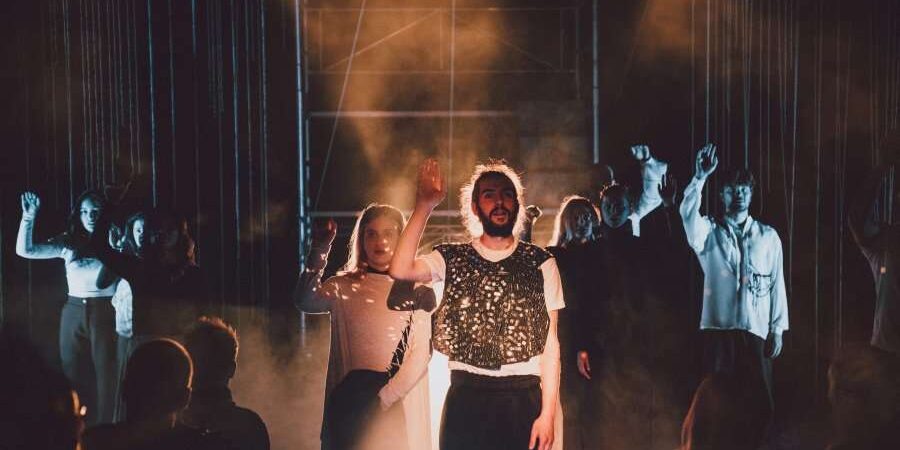|
Reviewer: Fatlinda Daku Teatri Oda
Darkness and river noise. A river continues to flow; we do not see it, but we know it is there. We can hear the sound. The actors walk around the stage, mostly dressed in black and white; they walk with different movements, as if shocked, as if they do not know where they are. The river now seems to have been transformed into fog and the actors are walk across it. The song "N'drrasë të vekut" is sung by actress Zana Berisha with music modified by Donika Rudi. She is grieving the loss of her lover. The actors' faces are full of pain, each one of them has a story of loss and grief that they still cannot process. They are dealing with the first phase of life after loss: Denial. A couple played by Ermal Sadiku and Qëndresa Jashari is dealing with another phase of grief: anger and bargaining. They are grieving the death of their daughter. They are angry and in pain, powerless and helpless. Her name was Drita (it means light in Albanian) They feel like they have lost their light of life and are wandering in the darkness with their pain. They blame themselves for the loss of their daughter. They play scenarios in their head about what could go differently. Trying to find answers to their rhetorical questions with a lot of “what if” and “if only’’. The pain is still there. No answers. The people they lost are not coming back. Wherever they are. Another phase has taken place: Depression, the hardest stage to leave. The fog is slowly disappearing, but the river stands still. "Try to move your finger" - the others are encouraging Redon Kika, who is playing another person grieving a lost one. But he doesn’t want to move. The unwillingness to move his body, not even his finger metaphorically tells a lot about this stage of pain. When you feel like it's better to hold on to the pain or else you will not feel the presence of the person you lost. If you ‘move’ you will accept that they are not here anymore, and in this stage that is the last thing you want to do. But that’s exactly what you should do. You should set yourself free and leave space for the other phase: Acceptance Hope also returns for the couple who have lost their daughter, as they are given the news; they are about to have another daughter. This time they want to name her Diella (it mean sun in Albanian) as sunlight that restores their lost hope and above all brings them back to life… A personal touch There wasn’t a lot of dialogue in this performance, but still, it was enough to understand and feel the pain they had. It felt to me that the audience was also in that river, with them on a journey of healing from the pain that is hidden inside us for different reasons. The mastery of the director Florent Mehmeti, combing the play of words, the play of music, and the body language of actors, made us, the audience, feel pain for their pain - and then feel pain for our pain. One of the most significant moments was when, at the end of the show, Labinot Raci wore a black vest with small mirrors on it. The mirrors reflected the light in them and in the audience. He asked all of us to say the name of our lost ones, to follow the hand gestures the actors did, reminding us that people exist because we make them exist, they are with us, in our memory, even if they left. The feelings that they gave us are with us and we should cherish that. The performance gives the message that in life we must accept the river we are in, feel it, have patience, and above all understand that the river is not us, the river will change direction and we will come out of the river. It is a very well-thought out representation of the circle of life. The show ended with the voice of birds singing and the sounds of a calm river, and I, like many others in the audience, left the room thinking about my lost ones and appreciating them even more for all the feelings they gave me. Author and director: Florent Mehmeti Co-authors of the text: Lirak Çelaj & Matt Opatrny Assistant director: Daniela Markaj Visual concept and lighting design: Yann Perregaux-Dielf Music: Donika Rudi Singing: Kaltrina Miftari, Qëndresa Jashari, Zana Berisha Costumes: Martina Shtufi
0 Comments
Leave a Reply. |
Kosovo Theatre ReviewsReviews and creative responses to theatre productions in Kosovo Archives
November 2022
Categories |

 RSS Feed
RSS Feed
